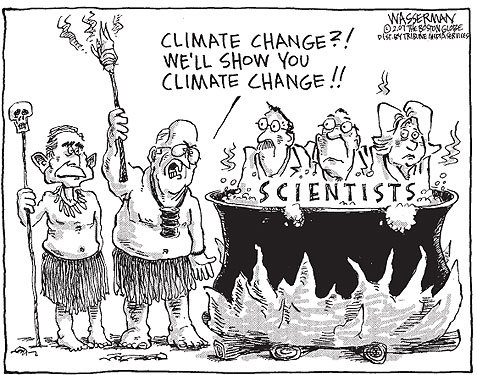He just looks cool, doesn't he? Anyway, he is pretty much a genius and gave a great talk on his research with lasers with applications for physics as well as biology. He is an engaging speaker as well. After an intense talk, he posed the question, "Why would someone like me leave science to be the director of a DOE lab or a government position?" Answer: Climate change. He gave a brief discussion on why he thinks climate change needs to be discussed and some talking points on how to sell the concept to the public.
It is less of a hard sell in the UK, but in America, it still takes a lot of convincing to get people to even trust a scientist. Scientists are generally seen as heathen, non-believer know-it-alls who are telling god's children how to live their lives, and god wouldn't like that, would he? Even someone as awesome as this:
Anyway, Dr Chu made some interesting comments, like how he is not 100% sure of the cause or the effect of climate change, but he is well more than 50% sure, and that should be enough to at least want to try something. He also commented that in response to people who say that we should "wait and see" when it comes to climate change do not understand that it takes approximately 100 years for the deep oceans to come to equilibrium with the surface. This means that whatever we have done on the surface will not have an effect on the world-wide environs for 10 decades.
Dr Chu said that the Department of Energy is funding a new initiative called ARPA-E which invests in short-term cockamamie ventures to solve the energy crisis. Dr Chu made the point of saying that most will fail, but if one in 30 is "okay" and one in 50 is a success, then it is a worthwhile investment. I think that this is a good investment, particularly for short-term and honestly, we need more support for "cockamamie" theories as the best scientific discoveries have come from this.
After his talk, I got a chance to speak with him in person. I asked him what the DoE is doing to make their current investments sustainable (see how I used that word there?) to last beyond one 2-year government (one that has just ended today). What frightens me is that there are some great things that are being done in this government, but as soon as a new one takes over (at any level) they can begin reversing great ideas (Kyoto Protocol anyone?)
To be fair, this was not a very polite question to ask him, as it was not the reason he was there, but I was curious and I had a chance to ask. Why not? He answered in a politicians sort of way, with an answer that I accept, but am not happy about. He said that he believes to make the future sustainable we need to educate children; that children are the ones who got their parents to wear seatbelts and children got their parents to quit smoking, so children have the power to teach their parents to be responsible to the environment. Logically, I asked if the DoE was funding any outreach projects or working towards communicating with children. Dr Chu responded with a polite, but conversation-ending "No." Fair enough.
We need to be investing in communicating with children. I spent the next talk trying to imagine ways to implement this myself, and making a pledge to my own future that I would be more proactive in trying to communicate science to children. The rhetoric surrounding climate change needs to be modified. Some people are sick of hearing about it, but maybe that is because we see little progress. Anti-progressives rudely comment on science and the people behind the science. The thing that irritates me the most about the Bush Administration is that it touted being ignorant as being acceptable. That the intelligent people in the world were the elite snobs who are trying to tell you how to live your life. I could devote an entire post to my frustration, but here is not the place. I will save that for another day. Instead, I will simply do this:
I appreciate Dr Chu taking his time to speak with me and I hope he tries to do what he can to educate the children of not just America, but the world.
Dr Chu ended his talk with this Native American saying and I will, too, cliché and repeated advice aside: "Treat the Earth well. It was not given to you by your parents; it was loaned to you by your children"



No comments:
Post a Comment